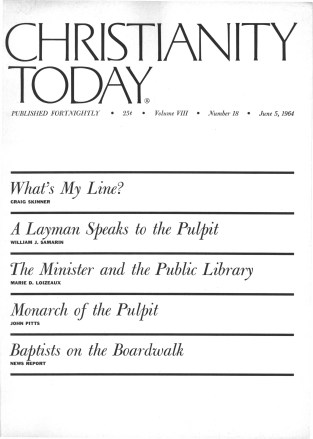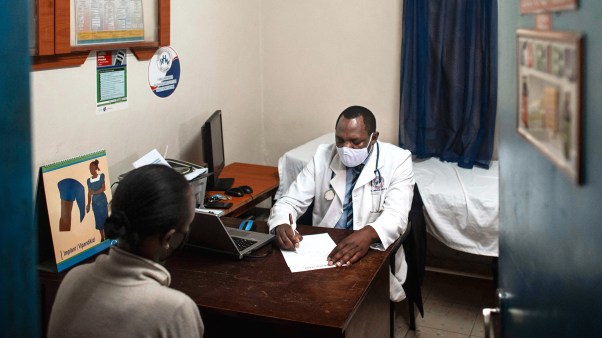A leading member of a midwestern church came to his minister with a problem. Obviously tense and disturbed, he said, “I don’t know just how to begin, pastor. Well, to tell you the truth, there is something terrible that I’ve just learned about. Little Jenny told us last night that she is going to have a baby!” And having said this, he lost control of himself and began to cry.
The pastor knew Jenny well. She had been raised in his church, and he had observed her and given spiritual guidance to her for fifteen years. Now he sat with this dedicated Christian as they both puzzled over the question that loomed so large: “Why?” But more immediately another question had to be faced: “Pastor, what can we do?”
Anyone who has faced such a situation knows the feelings suffered by the unwed parents: disgrace, guilt, failure, rejection, hatred, utter bewilderment. In their general confusion upon learning of the pregnancy, approximately half of the unwed parents and their relatives will seek out a minister for help. But will the minister be prepared to offer help? Will he know what sort of guidance and support to give?
This problem is becoming more and more acute throughout the country. There is no accurate way of determining the number of young girls and older women who bear children out of wedlock each year, because of the many alternatives for dealing with the unplanned child. The unwed mother-to-be may have an illegal abortion or enter into a forced marriage. She may decide to keep the baby and bear the shame, perhaps falsifying information for the birth certificate. She may make use of the adoption black market or of the maternity home or hospital with a licensed adoption agency, or she may place the child privately with some “deserving” couple. But taking the number of known births and allowing for variables, it is estimated that some 250,000 children will be born this year to unmarried parents. Contrary to what is usually thought, the rate of illegitimate births for young girls has been less than that for older women. Clark E. Vincent, in his excellent study Unmarried Mothers, reported (p. 1) that during the twenty-year period 1938–1958, the rate of births to unmarried girls from 15 to 19 increased by 108 per cent, while the rate to those aged 25 to 29 increased by 453 per cent.
What is to become of Jenny and the thousands of others like her? The public has many and varied feelings toward unwed parents and their child. Very harsh and judgmental treatment has long been the rule, and though the trend is toward more protective and compassionate care, there is yet much to be desired. Even in the churches, one finds surprisingly much of the old punitive attitude and little of the feeling of Jesus: “Neither do I condemn you; go, and do not sin again.” It should be realized that the punitive approach with its restrictive treatment does not produce any substantial saving in funds, nor does it generally promote reforms. It does, however, create human suffering, bitterness, further delinquency, and humiliation. The far more desirable attitude—and indeed the only Christian one—is that of rehabilitation. This approach is now practiced to some degree by many professions throughout the country. But it does not yet appear to be the feeling of most Christians. One might suggest that by their feelings toward unwed parents, other persons may sin more than the girl and boy involved.
Getting back to Jenny, what can and what should the local minister do for an unwed mother who comes to him for help? He can suggest a quiet and quick marriage—but he should resist this strong and natural temptation. Marriage may appear to be the morally correct step, and many a minister can point to an occasional success story to prove the wisdom of this. But it should be realized that the couple’s sexual and psychological experiences usually will work against the establishment of a sound marriage. The unwed parents will often admit the impossibility of attempting to base a marriage on their over-eagerness for sexual experiences. Far more than they need a husband or wife, the unwed parents need help that will provide a lasting solution to their immediate problem.
The minister can suggest that he knows a very fine couple who would like to adopt a baby without going through the usual time-consuming and sometimes costly channels. He should, however, strongly advise against this. In many states an adoption can be legally effected only through a licensed adoption agency. Still, private placements are often made because no strong objections are voiced and because this seems best for the baby. Difficulties arise when the baby is born defective or the adopting parents change their minds. Experience has proved that adoption agencies usually do a superior job. A minister, doctor, lawyer, or some other well-meaning person cannot match the ability and resources of an adoption agency. The minister should also discourage relatives who consider adopting the child. It is inconceivable that a child could be reared normally under these circumstances, to say nothing of the effect on the mother.
Many other possibilities might occur to the minister, the unwed parents, or the relatives. All should keep in mind, however, that much more is at issue than the future birth and development of an unplanned child. A spiritual and emotional crisis for all concerned is taking place. The feelings of the parents were briefly mentioned above. The young mother usually feels frantically alone and unable to face her immediate problems, much less the desperate future. One thing she needs throughout this experience is support and understanding helpfulness. The unwed father also feels confusion, tension, guilt, and conflict. If these are not alleviated, his future adjustment to life may be greatly impaired. Both need a wise spiritual counselor. Often the minister will be the only person who can bring a calm and sane approach to the situation. He must be sensitive to the feelings and needs of all concerned. But beyond this, he should be prepared to make referral to other persons and groups whose abilities and resources are needed.
The National Association on Services to Unmarried Parents believes that the unmarried mother needs personal counseling services, medical care, practical assistance with living and financial arrangements, the help of a child-care agency in working out plans for the baby, legal assistance, and pastoral counseling. The Child Welfare League of America is the professional social work organization that sets standards for services to unmarried parents. Its view differs from past attitudes toward illegitimacy, for it completely embraces the idea of saving the people involved, with concern for both parents and child.
Of all the possibilities of help for the unwed mother, the best in most cases is a carefully selected maternity home. If the minister has made a prior investigation, he will be able to refer her to a maternity home or hospital that is equipped to care for her. However, while there are some 200 such agencies throughout the country, not many of them measure up to the best standards.
The progressive and well-staffed maternity home is the agency of society best able to meet the needs of the unwed mother and her child. Because the mother’s immediate physical and emotional needs and her legal responsibilities are more acute than the father’s, the maternity home is organized primarily to deal with her, although some few homes are beginning to work also with the unwed father. The role of the maternity home has changed with a growth in the understanding of the mother, the development of greater skills on the part of the staff, and the increased availability of other community resources. In earlier days the maternity home provided the mother with some measure of environmental and spiritual security, medical care, and moralistic teachings. The basic purpose still includes these with various emphases; yet the ideal situation will seek to meet the mother’s needs as an individual without shutting her off completely from the natural flow of life. The local situation and the degree of confidentiality desired will naturally determine the social and community contacts. In any event, in a good maternity home the unwed mother who wants to make the best of a tragic event in her life can find acceptance and security; constructive relationships with other girls and staff members; planned daily activities; personal growth through self-understanding with the help of social workers, psychologists, ministers, and others; and the all-important medical care.
The experience of unwed parenthood may begin as tragedy, but it can turn out to be a therapeutic and growth-producing event. If the minister’s help is sought, the outcome, to a considerable extent, will be based on his skill and advice. It is very important for him to offer spiritual strength and counsel, to be able to find a reputable maternity home, and to be willing to give the necessary time and effort for long-term support and care. This is not an easy task, nor is it always a pleasant one; but it can be an extremely beneficial and important work in the name of the loving and forgiving God. Because about half of the unwed parents seek help through the church, it is essential that ministers know how to give them the realistic and spiritual guidance that is so greatly needed.










